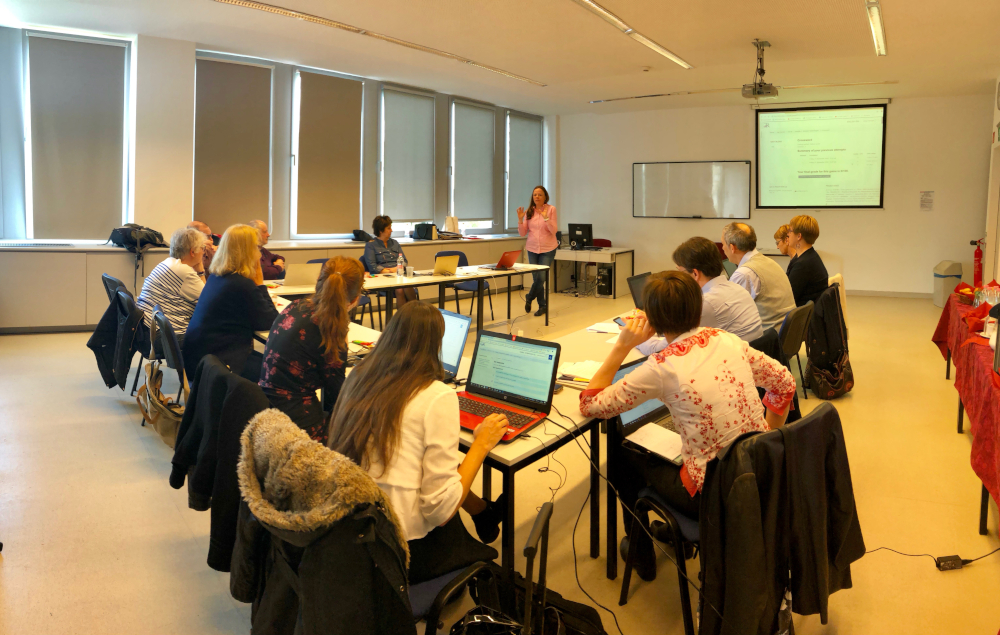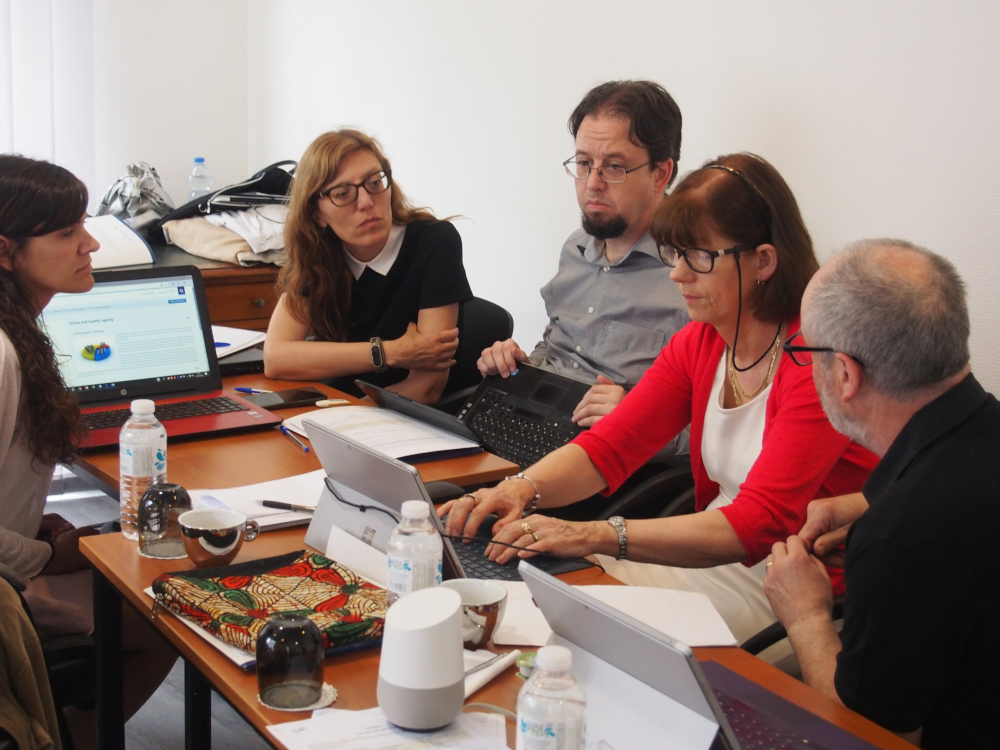
Approach-shaping, self-tuition and teaching others, and involving an entire generation: the Erasmus+ project implemented by Prompt-H Ltd. of Gödöllő, addressing the challenges of providing home care for the elderly through online tools, is really complex.
Practical, online, experience-oriented: A Course for the Elderly and their Carers
| Institution: PROMPT-H IT Education, Trade and Service Ltd. Project title: Grandis XXI. - Vocational Education for Interprofessional Elderly Care in the 21st century Project Coordinator: Dr. József Lengyel Website: www.grandis21.hu |
There's a given social issue, to which someone has an innovative solution. This is the basic situation which Erasmus+ projects start from, as has Grandis XXI., whose starting point was the issue of an ageing society. The best solution would be if as many old-age pensioners could take care of themselves as possible, for as long as possible - if necessary, with some remote help. This remote help can today be provided through smart devices, which offer safety both to the users and their relatives. Think, for example, of a blood pressure meter, the readings of which a smart phone sends to the family doctor. Or a platform where a social worker can monitor what food or medicine his or her client just needs. However, it doesn't matter how good these tools are if the potential users can't use them.
The first task: groundwork
So the task was given: teach these people how to use smart devices effectively. And the solution is a practice-oriented, modular and competence-based training programme (syllabus and curriculum), Grandis XXI., developed by PROMPT-H IT Education, Trade and Service Ltd. with support from Erasmus+ KA2.
In order to allow the exchange of best practices, too, four more countries (the UK, Ireland, France and Spain) were also invited to the preparatory and testing work between October 2016 and June 2019.
The joint efforts were coordinated by Managing Director Dr. József Lengyel, Project Leader, and Ágnes Huszár, coordinator of e-learning development and education. PROMPT-H has been active in the field of education since 1989; the head of the company had formerly taught mathematics and IT in higher education. They'd had a lot of experience in adult education and IT vocational training, but they have also developed educational materials and medical applications.

The outcomes of the analysis
"This time we dreamt up a system - with a smart watch, scales, blood pressure gauge and such things - which is cheap to maintain and convenient to use. I tested many of its elements myself, and I knew its defects. Then it was time for users to come. Or to be precise, the professionals first, who will then train them", says Dr. József Lengyel.
This required a needs analysis first, conducted among the elderly and their carers; five hundred questionnaires were sent out in five countries. The findings indicated that a large proportion of the target group was open to the training. Internet use also showed a more promising picture than expected. "It turned out that in Hungary, too, there were a number of elderly people who were really active online - almost competing with young people in terms of presence on social media sites, says Ágnes Huszár.
"We also found out, however, that the technologies available in each country were different, and that meant a rather low level in the case of Hungary, József Lengyel added. "Therefore, we'd made a common collection even before we started to develop the curriculum: each partner listed the tools used in their respective countries (activity monitoring bracelets, motion sensors, cameras, remote diagnostic devices, etc.), and we chose the core elements available everywhere from hundreds of items."
The level of development of the social sector was also different from partner to partner. The Irish, for example, had formerly had e-health education; in Hungary, however, the OKJ (National Qualifications Register) courses in the social and health sectors only included minimum information about the smart tools which can be used in caring or about e-health. The Spanish university partner is especially competent in IT; they use advanced health and IT devices in education. Also, they were the ones who suggested inviting a gerontology professional.
In Western Europe, social care and the strategy for the elderly are usually more advanced than here in Hungary, but the lack of finances is a problem there, too. What turned out about Hungarians is that the basic caring network itself works fine, but underpayment and burnout do a lot of harm. Remote access can help that, too, as it alleviates everyday burdens.
Mutually useful
"We don't think it's a problem that challenges are different everywhere, because that's how we can complement and help each other", says Ágnes Huszár. "We tried to integrate everything which is better elsewhere into the training." Meanwhile, they also realised that, besides the obvious target groups, it was also useful to involve VET students, old-age pensioners still capable of work, as well as family members.
Development also includes shaping attitude. It was interesting to see that when certain participants could have had access to any device, they asked for a traditional thermometer instead of a digital one. What it told project owners was that they couldn't proceed with very large steps.
The e-learning curriculum and the related course was prepared in English, Spanish, French and Hungarian. It consisted of four modules: digital skills for carers, active and healthy ageing, and technologies applicable in elderly care and virtual communities.
The training was implemented in a practice-oriented manner, which means that the course includes practical and interactive case studies and project work. It is, of course, conducted online, but if needed, the materials are also available for courses requiring personal attendance, held by a teacher.
In June 2019, 68 students completed the course in the trial phase (social workers engaged in elderly care, teachers working in social and health VET, and a few students), including 18 Hungarians. They learned the curriculum with mentors' support, completing the tasks required to proceed to the other modules of the course.

A sense of achievement and the future
After the first shy steps, the first successes made the participants very happy. "Perhaps the online communication and learning opportunities, the apps maintaining activity, the online games and the audio books were the most popular ones", Ágnes Huszár explained. "But there were also others who were immensely happy to create a video or organise a trip."
This, of course, is still not the finish line; the work continues. Mobile applications and an e-book with case studies are also being developed, which the initiators expect to bring further professional relations. The goal was to make the programme sustainable. The first step to that was receiving accreditation in the adult education system, too. Another project is underway, too: E-Smart Senior, which also addresses the elderly. We have also kept in touch with our foreign partners. "The English are already nudging us to submit a joint project application", says József Lengyel, already talking about the future. "We would be happy to continue with the work."
|
Project values: They have developed a practice-oriented, competency-based and modular curricula which uses a lot of digital tools, thus improving students' ICT competencies. The project is characterised by a diverse partnership: small enterprises, VET and adult education organisations, as well as the coordinated work of two universities allowed the extensive implementation of the goals. The innovative project outcomes (curriculum, complex educational contents, e-learning platform) are available to and adaptable by anyone. |
Last modified: 27-07-2020















